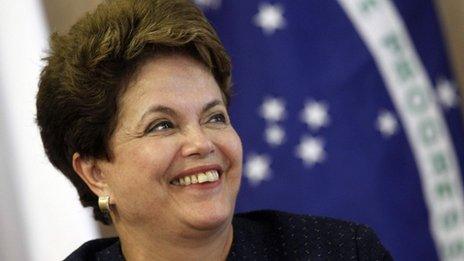Brazil's Rousseff seeks US help with skills shortage
- Published
Brazilian students studying in New York City share their stories
Science education and training are high on the agenda for Brazilian President Dilma Rousseff's first official visit to the US, as her government seeks to tackle a growing problem: the lack of skilled workers in Brazil.
The first time Lucas Oliveira, a student of mechanical, electrical and computer engineering from Brazil, boarded a plane bound for another country, he embarked on what he describes as "an incredible life opportunity".
Mr Oliveira, 21, is part of a group of 650 Brazilian undergraduate students who arrived in the US in January for a one-year exchange programme in American universities.
Until then, he said, "the furthest I'd gone had been to Venezuela - by car."
Like Mr Oliveira, Guilherme Cruzatto could not pay for his engineering studies at an American university.
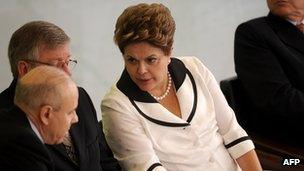
Ms Rousseff's focus is more on domestic issues than her predecessor Lula
But thanks to a Brazilian government scholarship, and academic agreements between US and Brazilian institutions, both men are living in the halls of the Catholic University of America, in Washington DC.
Their food and accommodation is paid for, and each man receives a $300 (£188) allowance per month.
"I believe this programme will be one of the most enriching experiences of our lives," says Mr Cruzatto, 23.
Mr Oliveira and Mr Cruzatto are in the first group of 100,000 students that Brazil plans to send to universities around the world to acquire skills.
Under the programme, Science Without Border, which runs until 2015, students will study engineering, biotechnology, ocean science and other fields that could boost economic growth.
Around 20,000 of those will study in the US.
When they return home, Mr Oliveira and Mr Cruzatto, who are interns at the Nasa Goddard Space Flight Center, in Maryland, are likely to be in high demand in Brazil's job market.
A decade of strong economic growth in Brazil has pushed unemployment to a record low but it has also highlighted the shortage of qualified workers, especially in fields like engineering.
The government fears that this could eventually halt the country's development.
This concern is high on President Rousseff's agenda as she visits the US.
Ms Rousseff will address business leaders in a bid to promote co-operation and innovation between companies.
She is also visiting Boston to court top international educational institutions such as Harvard University and the Massachusetts Institute of Technology.
Rebuilding confidence
Ms Rousseff's two-day tour returns President Barack Obama's official visit to Brazil in March last year, less than three months after she took office.
Analysts saw Mr Obama's visit as a goodwill gesture after a time when US-Brazil diplomatic relations had been somewhat strained.
President Rousseff's predecessor, Luiz Inacio Lula da Silva, once called "the man" and "the most popular politician on Earth" by Mr Obama, took his country to an unprecedented level of prominence on the international scene.
But in doing so, he was often at odds with Western powers, in particular the US.
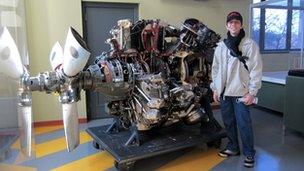
Lucas Oliveira says studying in the US is the chance of a lifetime
Ms Rousseff, described as a pragmatic, managerial and business-minded leader, differs in tone and style from the flamboyant Lula.
She is the first leader of the Bric countries - Brazil, Russia, India and China- to visit the US after the Bric meeting last month in Delhi.
She indicated that she would voice the group's concerns with sanctions against Iran.
But Ms Rousseff is likely to concentrate on aspects of the bilateral relationship that have worked in the past.
"She is much more focused on Brazil's internal challenges," says Paulo Sotero, director of the Brazil Institute at the Woodrow Wilson Center, a think tank in Washington.
"They have to do with increasing productivity of the economy, increasing competitiveness - especially in the industrial sector - and dealing with deficits in infrastructure and education, which were exposed by Brazil's recent economic success."
Broad but shallow
The Brazilian leader will meet President Obama at the White House, but no state dinner or state functions, like those offered to the leaders of China and India, will take place.
In the highly choreographed world of presidential diplomacy, the gesture has been received with disappointment on the Brazilian side.
"Brazil feels that it's now an important emerging power. It wants to be treated like China and India," says Joao Augusto de Castro Neves, an analyst at the Eurasia Group.
As part of its new aspirations, Brazil wants a permanent seat at the UN Security Council, and resents the lack of US support.
The fact that the US supports India, which developed nuclear weapons against the wishes of the international community, is another source of frustration.
Analysts describe relations between the two biggest and most influential countries in the Americas as broad but shallow.
"It's a relationship looking for something," says Peter Hakim, president emeritus of the Inter-American Dialogue, external. "Both countries have a lot to offer one another, but they have to get started."
Luis Barrucho contributed to this report from Sao Paulo
- Published6 March 2012
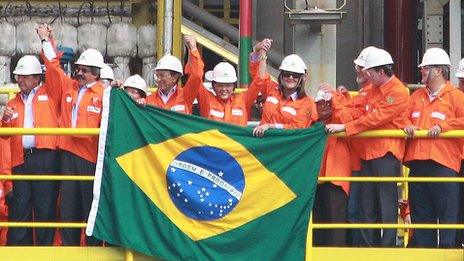
- Published8 January 2012

- Published13 April 2016
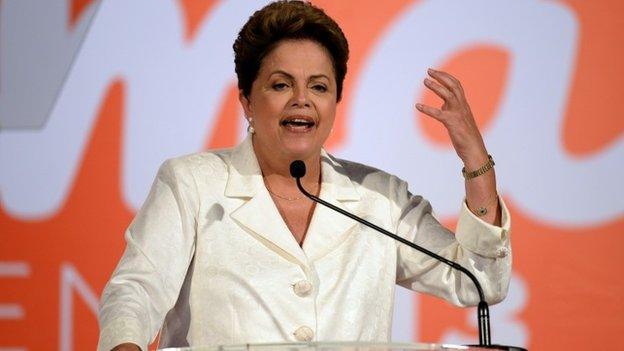
- Published29 December 2011
